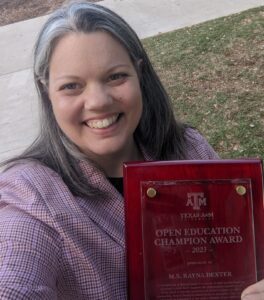Instructional Associate Professor Rayna Dexter Earns Award For Open Educational Resources Efforts
The first day of each semester comes with a big sigh of relief for students in Rayna Dexter’s classes.
That’s when they hear that the significant cost of books has been eliminated for the class, thanks to Dexter’s advocacy of open educational resources.
“They love it — every time,” Dexter said. “They say thank you. I get it. As somebody who put myself through school and worked three jobs, I’m still paying for my textbooks. If I can keep them from having to do that, then that’s a win.”

The instructional associate professor in the College of Performance, Visualization and Fine Arts was recently honored with an Open Educational Materials Award, alongside six other faculty members. The awards are sponsored by the Texas A&M Student Government Association, University Libraries and the University Administration. Dexter also won the award in 2020.
The average cost for a college textbook is $105.37, according to Education Data Initiative, and undergraduate students at four-year state universities pay an average of $1,226 per year for books and supplies.
Dexter was a first-generation college student, graduating from the University of Mount Union in Ohio in 2005 and earning her Master of Fine Arts degree from Kent State in 2009. Twenty-five percent of Texas A&M students are first-generation.
“It’s so important for college education to be accessible to anybody who wants it,” she said. “I feel like that’s what my career is about, trying to make sure that people who want to be included here feel included, in whatever form that takes.”
The work involved in open educational resources includes searching for online sources and content that can be accessed for free or low costs. Dexter began this process five years ago, and credits Tina Budzise-Weaver, an associate professor who was then subject librarian for performance studies, for helping to identify the University Libraries’ access to articles and e-books. Dexter also gained access to an online database that had book chapters, images and scholarly articles, and then crafted her classes from these different elements.
“I will say it’s an investment of time,” Dexter said. “That’s the tradeoff. It takes time to read what’s out there and find what’s relevant for your course. And is it at the right level for the group of students you’re teaching? There are some scholarly articles that if I handed to a freshman, they’re going to shut down. So finding things that are accessible not only in price but also in reading level.”
Another benefit is being able to customize for a class, and bringing in different perspectives from multiple authors, which aids student discussions and helps develop critical thinking skills, Dexter said.
Caroline Fu, a freshman economics major who took Dexter’s Aesthetics of Activism course (PERF 223) in the fall, nominated Dexter for the Open Educational Materials Award. Fu presented the award at the ceremony at the Great Hall in the YMCA Building, noting how Dexter shared her thoughts on the first day of class about how book costs affect college students.
“To join academia and then structure her class around accessibility made me feel really cared for and seen as her student, and as a result, I always knew I could reach out whenever I was struggling in my assignments,” Fu said in her remarks. “Thus, from the very beginning there was an inherent establishment of kindness and prioritization of mental and financial health, and that kind of judgment-free environment is something I truly appreciated in my freshman year of college.”
Dexter said the Texas A&M community is “catching on that this is a really important cause,” and that the University Libraries offer great support for interested faculty members.
“The principles of universal design teach that when you help one, you help all,” she said. “When I help first-generation students by choosing an open educational resource, everybody benefits. Whether they’re first generation or if their great grandpa was an Aggie, it doesn’t matter. They all benefit.”